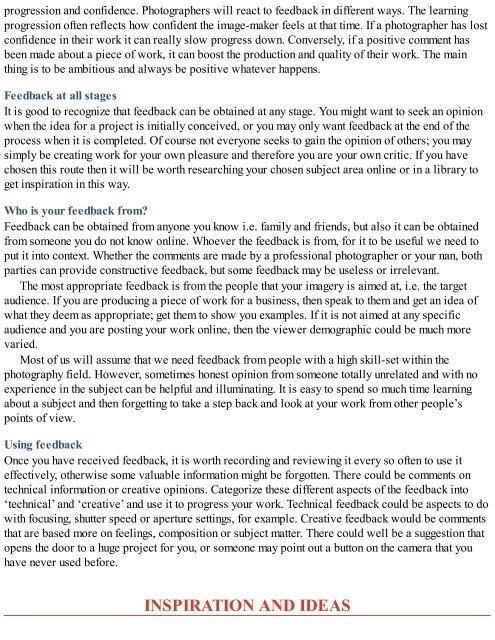Time-Lapse Photography Art and Techniques by Mark Higgins
Create successful ePaper yourself
Turn your PDF publications into a flip-book with our unique Google optimized e-Paper software.
progression <strong>and</strong> confidence. Photographers will react to feedback in different ways. The learning<br />
progression often reflects how confident the image-maker feels at that time. If a photographer has lost<br />
confidence in their work it can really slow progress down. Conversely, if a positive comment has<br />
been made about a piece of work, it can boost the production <strong>and</strong> quality of their work. The main<br />
thing is to be ambitious <strong>and</strong> always be positive whatever happens.<br />
Feedback at all stages<br />
It is good to recognize that feedback can be obtained at any stage. You might want to seek an opinion<br />
when the idea for a project is initially conceived, or you may only want feedback at the end of the<br />
process when it is completed. Of course not everyone seeks to gain the opinion of others; you may<br />
simply be creating work for your own pleasure <strong>and</strong> therefore you are your own critic. If you have<br />
chosen this route then it will be worth researching your chosen subject area online or in a library to<br />
get inspiration in this way.<br />
Who is your feedback from?<br />
Feedback can be obtained from anyone you know i.e. family <strong>and</strong> friends, but also it can be obtained<br />
from someone you do not know online. Whoever the feedback is from, for it to be useful we need to<br />
put it into context. Whether the comments are made <strong>by</strong> a professional photographer or your nan, both<br />
parties can provide constructive feedback, but some feedback may be useless or irrelevant.<br />
The most appropriate feedback is from the people that your imagery is aimed at, i.e. the target<br />
audience. If you are producing a piece of work for a business, then speak to them <strong>and</strong> get an idea of<br />
what they deem as appropriate; get them to show you examples. If it is not aimed at any specific<br />
audience <strong>and</strong> you are posting your work online, then the viewer demographic could be much more<br />
varied.<br />
Most of us will assume that we need feedback from people with a high skill-set within the<br />
photography field. However, sometimes honest opinion from someone totally unrelated <strong>and</strong> with no<br />
experience in the subject can be helpful <strong>and</strong> illuminating. It is easy to spend so much time learning<br />
about a subject <strong>and</strong> then forgetting to take a step back <strong>and</strong> look at your work from other people’s<br />
points of view.<br />
Using feedback<br />
Once you have received feedback, it is worth recording <strong>and</strong> reviewing it every so often to use it<br />
effectively, otherwise some valuable information might be forgotten. There could be comments on<br />
technical information or creative opinions. Categorize these different aspects of the feedback into<br />
‘technical’ <strong>and</strong> ‘creative’ <strong>and</strong> use it to progress your work. Technical feedback could be aspects to do<br />
with focusing, shutter speed or aperture settings, for example. Creative feedback would be comments<br />
that are based more on feelings, composition or subject matter. There could well be a suggestion that<br />
opens the door to a huge project for you, or someone may point out a button on the camera that you<br />
have never used before.<br />
INSPIRATION AND IDEAS

















